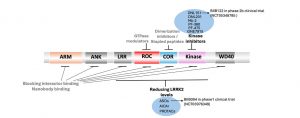Mutations in leucine-rich-repeat kinase 2 (LRRK2) are the most common causes of Parkinson’s disease (PD) up to date. Dysfunction in LRRK2 enzymatic activities and elevated protein levels are associated with the disease. How is LRRK2 activated, and what downstream molecular and cellular processes does LRRK2 regulate? Addressing these questions is crucial to decipher the disease mechanisms. In this review, Dr. Yulan Xiong and Dr. Jianzhong Yu at UConn Storrs discussed the upstream regulations and downstream substrates of LRRK2 as well as the cellular consequences caused by these regulations. Building on these basic findings, therapeutic strategies targeting LRRK2 and the challenges in clinical trials were also discussed. The important questions that are yet to be answered in the LRRK2 field were further highlighted. Particularly, three major recent discoveries from the Xiong lab have been highlighted in this review including a novel upstream regulation of LRRK2 mRNA levels, a new LRRK2 downstream kinase substrate involved in endocytosis, and a key and long-missing regulator of LRRK2 GTPase function.
